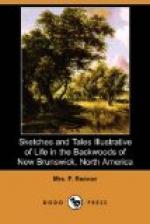brings his lay so close, that the ear is startled
with the human sound on the soft damp air. The
scene is changed when Sirius is triumphant, telling
us of the tropics, and that we live in rather an inexplicable
climate. Beneath his burning influence I have
glided down this creek when no sound was heard on earth
or air save the ripples of the paddle as it rose or
fell at the will of the child-like form which guided
the fragile bark. The dwellers on the margin of
these fair waters are as much at home upon them as
on land, and the children in particular are as amphibious
as the musk rats which people its banks, and which
scent the air somewhat heavily with what, in a fainter
degree, would be thought perfume. One can hardly
recall these dog-star days at that later season when
the pearly moon and brilliant stars shine down from
the deep blue sky on the crusted snows; when fairy
crystals are reflecting their cold bright beams on
the glistening ice, while the sleigh flies merrily
along, “with bell and bridle ringing,”
on the same path we held in summer with the light
canoe; when the breath congeals in a sheet of ice
around the face, and the clearness of the atmosphere
makes respiration difficult. To tell us that we
are in the same latitude with the sunny clime of Boulogne,
in France, shows us that America cannot be measured
by the European standard. A quarter of the globe
lies between us; they go to bed four hours before
we do, and are fast asleep while we are wide awake.
No one attempts to live in the country districts without
a farm. As the place where we lived had but a
house and one acre of land, none being vacant in that
immediate neighbourhood, and finding firing and pasturage
expensive, and furthermore wishing to raise our own
potatoes, and, if we liked, live in peas, a
lot of two hundred acres was purchased in the settlement,
styled, “par excellence,” “the
English,” (from the first settlers being of that
illustrious nation,) a distance of two miles from where
we then lived. Our house was a good one.
We did not like to leave it. Selling was out
of the question: so we e’en resolved to
take it with us, wishing, as the Highland robber did
of the haystack, that it had legs to walk. A
substitute for this was found in the universal resource
of New Brunswickers for all their wants, from the
cradle to the coffin, “the tree, the bonny greenwood
tree,” that gives the young life-blood of its
sweet sap for sugar—and even when consumed
by fire its white ashes yield them soap. I have
even seen wooden fire-irons, although they do not
go quite so far as their Yankee neighbours, who, letting
alone wooden clocks, deal besides in wooden hams,
nutmegs, and cucumber seeds. Two stout trees
were then felled (the meanest would have graced a
lordly park), and hewed with the axe into a pair of
gigantic sled runners. The house was raised from
its foundation and placed on these. Many hands
make light work; but, had those hands been all hired




